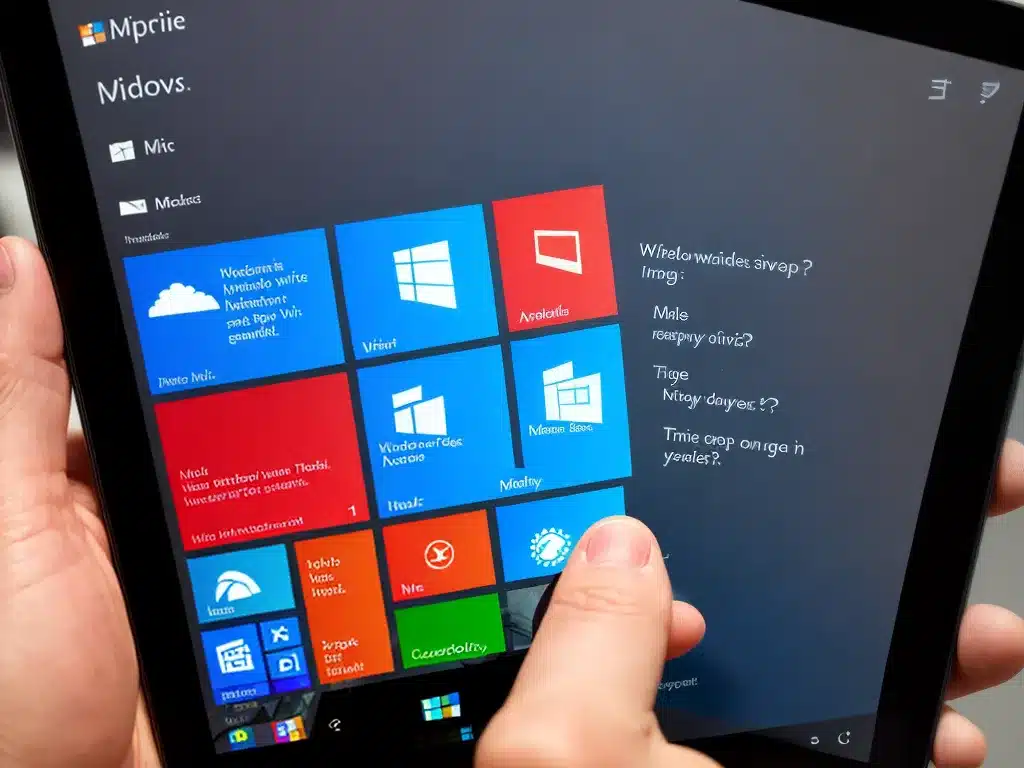
Overview of Windows 11 Compatibility
When Windows 11 is released later this year, I want to know if my existing apps and software will still work properly on the new operating system. As an app user, compatibility is one of my main concerns when upgrading to a new Windows version.
In general, Microsoft has stated that Windows 11 will be compatible with most applications and devices that worked with Windows 10. However, there are some key factors that determine compatibility:
Hardware Compatibility
Windows 11 has stricter hardware requirements than Windows 10. To run Windows 11, my device will need to have a 1 GHz or faster 64-bit processor, 4 GB RAM, 64 GB storage, UEFI secure boot, TPM 2.0, and DirectX 12 compatible graphics.
Older devices may not meet these requirements. I will need to check my PC specifications to ensure hardware compatibility.
Driver Support
Windows 11 will require updated drivers for some components like graphics cards and printers. Hardware and peripheral manufacturers will need to release Windows 11 compatible drivers for me to maintain full functionality.
Until I install new drivers, those devices may fail or work incorrectly in Windows 11. I should check with device manufacturers to ensure driver support.
64-bit Architecture
Windows 11 will only support 64-bit applications. Any 32-bit apps I have installed will not work unless they are re-compiled for 64-bit. This mainly affects older software and games.
Most modern applications are 64-bit already. But I should double check any legacy 32-bit apps I need to use.
Application Compatibility Testing
Microsoft has been testing popular software and games for compatibility issues. They have addressed many common problems that arose during testing.
However, it’s impossible to test all applications. There is still a chance specialized or proprietary apps that work fine in Windows 10 may have issues in Windows 11. Extensive testing will happen after public release.
I should check application developer websites for information about Windows 11 support. Some may already provide compatibility patches.
Tips for Maintaining Application Compatibility
Here are some best practices I can follow to maximize application compatibility when I upgrade to Windows 11:
- Check hardware requirements and update old drivers beforehand
- Verify all critical applications work on 64-bit architecture
- Install the latest app updates and patches for Windows 11 support
- Turn on Windows 11 compatibility mode for apps that have issues
- Contact developers about compatibility fixes for unsupported apps
- Consider re-installing problematic apps after upgrading
- Run apps as administrator if encountering permission errors
- Try older application versions that supported Windows 10
Maintaining compatibility may require some extra effort. But most apps should work fine in Windows 11. Planned testing and preparation will help ensure a smooth transition.
Will Specific Applications Work on Windows 11?
Beyond general compatibility factors, I am probably wondering about support for the specific applications I use everyday. Here is the current status for some popular programs:
Microsoft Office
- Microsoft 365 apps fully supported
- Office 2019 and 2016 supported with patches
- Office 2013 mostly compatible but no longer supported
Office is well-tested and most versions will work fine in Windows 11. I may need to perform some minor updates.
Adobe Creative Cloud
- Adobe is fully supporting Windows 11 for all major products
- Compatibility updates already released for CC 2021 versions
- Older versions should work but may have minor issues
Adobe software will transition smoothly to Windows 11, especially the latest releases.
Zoom
- Zoom has confirmed Windows 11 support
- The Zoom desktop client is compatible as of version 5.6.6
- No major issues expected during testing
I can continue using Zoom without problems after upgrading.
Chrome and Firefox Browsers
- Both browsers will be compatible with Windows 11
- Updates will be released to optimize performance
- Extensions and web apps should function correctly
Chrome and Firefox will work normally for browsing websites and web applications.
Gaming Clients Like Steam, Origin, GOG
- Gaming platforms are supporting Windows 11
- Some older games may require updates or tweaks
- DRM issues more likely with unsupported titles
Most major games will run fine. But I should check Windows 11 compatibility info for unsupported games.
Other Apps
There are too many applications to list definitively. But any apps that worked in Windows 10 and meet system requirements should transition smoothly to Windows 11 in most cases.
I can research the status of important applications from developer websites and tech community discussions. Extensive compatibility testing will also occur after public release.
Summary of Key Points
To wrap up, these are the key takeaways about Windows 11 application compatibility:
- Hardware, drivers, and 64-bit architecture determine baseline compatibility
- Microsoft has tested most popular software already
- Check hardware requirements and update old drivers first
- Verify 64-bit support for all critical legacy applications
- Install available app patches and updates for compatibility
- Enable compatibility mode and adjust permissions if needed
- Contact developers about fixes for unsupported applications
- Most apps should work fine, but additional testing will continue after release
- Research the status of important applications before upgrading
Upgrading to Windows 11 will require some preparation and adjustments to maintain full application functionality. But Microsoft is committed to wide compatibility. With proper planning beforehand, I can expect a smooth experience running my existing apps and software on Windows 11.












